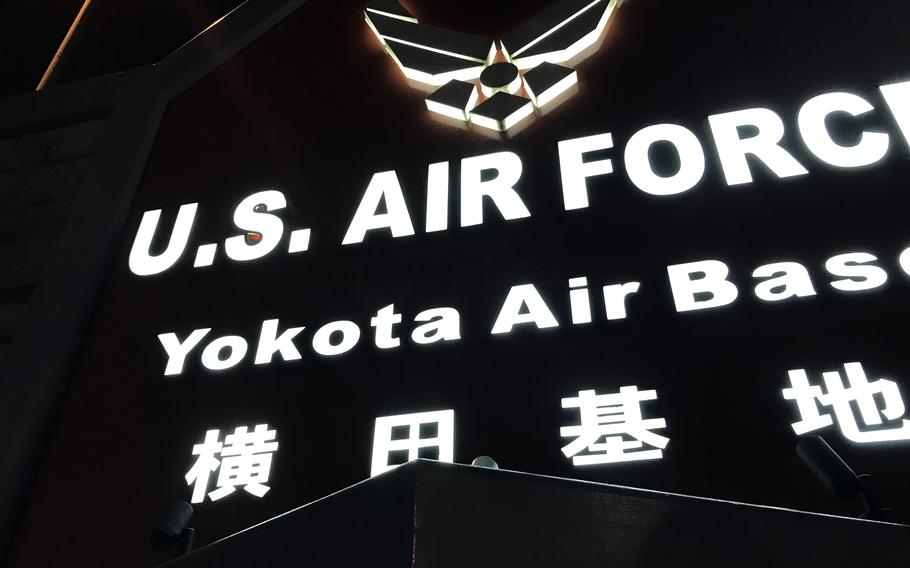
Yokota Air Base in western Tokyo is home to the 374th Airlift Wing, 5th Air Force and U.S. Forces Japan. (Stars and Stripes)
YOKOTA AIR BASE, Japan — A group of western Tokyo residents are urging the Japanese government to test water at the home of U.S. Forces Japan amid concerns about the past use of toxic firefighting foam.
The 45-strong residents’ group, whose name roughly translates to “a group that reveals PFAS contamination in the Tama area,” laid out its concerns in a letter sent Nov. 2 to Japanese Prime Minister Fumio Kishida. The letter, signed by the group’s 12 co-leaders, was also addressed to ministers responsible for health, the environment, defense and foreign affairs and the Tokyo Metropolitan Government.
Tests of people living downstream of Yokota, carried out at the behest of the residents’ group between November 2020 and June, found that more than half of those tested had high levels of PFAS in their blood, according to the residents’ group.
The group now wants the Japanese government to conduct an on-base survey to check for PFAS contamination at Yokota since the fire-extinguishing foam was used there in the past and there were PFAS spills between 2010 and 2012.
“A request should be made to the U.S. Forces to enter Yokota Air Base and check for PFAS contamination,” the letter states.
In 2012, nearly 800 gallons of concentrated firefighting foam seeped into the ground from a storage tank at Yokota, according to an Air Force spill report cited in the Asia-Pacific Journal on Aug. 15, 2020.
PFAS, short for poly and perfluoroalkyl substances, is a class of chemicals linked to an increased risk of certain tumors of the liver, testicles, breasts and pancreas, according to the American Cancer Society. The U.S. Environmental Protection Agency updated its health advisories last year to say no level of PFAS chemicals, which include PFOS and PFOA, is safe in drinking water.
The synthetic compounds accumulate in the body over time, according to the agency.
The fire-suppression systems at Yokota that held PFAS are no longer in service as part of wider effort to replace those systems with materials other than PFAS at bases across Japan.
“All our PFAS systems have already been locked out so they can’t be used,” Col. Andrew Roddan, commander of the base and its 374th Airlift Wing, told reporters on June 26.
Yokota’s 374th Airlift Wing is committed to protecting the health of personnel, their families and surrounding communities, wing spokesman 1st Lt. Danny Rangel said in a text message Friday.
“We will continue to adhere to all relevant agreements, obligations and procedures as good stewards of our installations and environment,” he wrote.
The residents, in their letter, also asked for nationwide blood testing for PFAS.
“The number of blood tests conducted by the group of 791 people was extremely small compared to the Tama area’s population of about 4.3 million people, and many residents have expressed their desire to have blood tested,” the letter states.
The Tama area encompasses Yokota and numerous communities in western Tokyo.
Japan’s Environment Ministry told the group when they met two weeks ago that the health impacts of PFAS in people’s blood are unclear, according to a document provided by the group.
Japan’s Defense Ministry in July detailed the foam spill on Yokota to local governments.
“We will take appropriate measures by consulting with related local governments in regards to entering the base and conducting a survey,” the ministry stated, according to the document provided by the residents.
The residents’ group also asked the Japanese government to examine the impact of PFAS on children, set new water quality guidelines, conduct a nationwide water survey, and ask companies and public facilities whether they have used PFAS.
This is the first time the group had made requests to the Japanese government since it conducted the blood tests, the group’s co-leader, Yukio Negiyama, told Stars and Stripes by phone Tuesday.
A similar request was made with Tokyo Metropolitan Government on Oct. 31, according to the group.